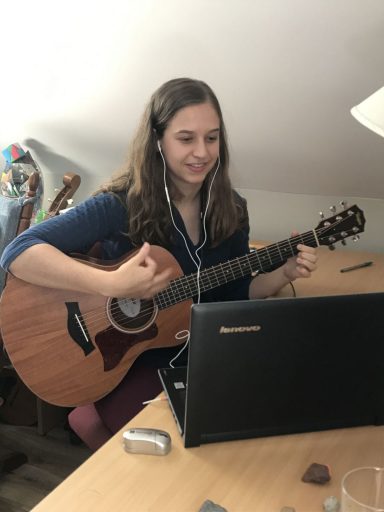
Like many other healthcare providers around the world, music therapy faculty and students from the Florida State University College of Music have reinvented how they deliver services due to the COVID-19 pandemic.
Now, FSU’s music therapists are providing tele-music therapy, which allows them to provide beneficial services to clients in a safe manner and offers opportunities and challenges for student training.
“The Music Therapy program at Florida State is one of the nation’s largest and most respected programs,” said Michael Thrasher, interim dean of the FSU College of Music. “Our students and faculty have long been on the cutting edge of the profession, and we are proud of their creativity and ingenuity during the current health crisis. We appreciate their efforts to continue meeting the needs of both students and clients.”
Under the supervision of Assistant Professor of Music Therapy Lori Gooding, students were able to provide music therapy services to participants enrolled in a community program over the summer and will continue to work with other community partners this fall.
Music therapy sessions focused on life, social, independence and employability skills and include live music. Virtual sessions still give participants the opportunity to engage in active music making, movement to music, songwriting and song discussion.
“Switching to teleservices unexpectedly was a challenge, but it also provided the opportunity for us to rethink current practice and expand how we prepare students for practice moving forward,” Gooding said. “And, equally as important, we were able to provide music therapy services when members of our community — perhaps now more than ever — need access to services and support.”
Over the summer, FSU’s music therapy program partnered with multiple organizations to provide tele-music therapy services for students and young adults with disabilities, including the ACE Transition Program, State of Florida Vocational Rehabilitation, Leon County Schools, KEYS (Keys to Exceptional Youth Success- keysbigbend.org) and Independence Landing.
Before COVID-19 required the program to be solely remote, Cassie Ferrer, a senior who participated in the program this summer, was skeptical about tele-services.
“I now understand how using tele-services after we return to campus can be beneficial to some clients, maybe even make music therapy more accessible to them,” Ferrer said. “It is an incredible alternative for in-person clinical hours and really works, both for us as students and for the clients. I feel like we gained a lot from doing this online, rather than losing anything.”




